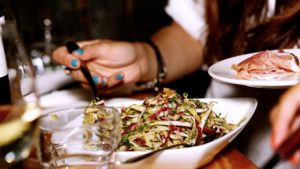- Calls to this hotline are currently being directed to Within Health or Eating Disorder Solutions
- Representatives are standing by 24/7 to help answer your questions
- All calls are confidential and HIPAA compliant
- There is no obligation or cost to call
- Eating Disorder Hope does not receive any commissions or fees dependent upon which provider you select
- Additional treatment providers are located on our directory or samhsa.gov
Are Vegan Diets Associated with Eating Disorders?

Contributor: Crystal Karges, MS, RDN, IBCLC, Director of Content and Social Media at Eating Disorder Hope/Addiction Hope
For many individuals, the decision to follow a vegan diet is a deeply personal decision, one that reflects a love and respect for animals and/or a commitment to refraining from consumption of any type of animal products. A vegan diet will avoid any and all types of animal products, including meat, poultry, fish, eggs, and dairy products, such as milk, cheese, yogurt, and the like.
For a person who may be in recovery from an eating disorder or perhaps even susceptible to having an eating disorder, any type of restrictive eating, including a vegan diet, can be triggering.
Understanding the Potential Damage of Dieting
Even when done for the best-intended reasons, any form of eating that excludes an entire food group is never optimal for a person in recovery from an eating disorder. Restricting any types of foods can become an unjustified reason for limiting overall caloric intake, making it much more difficult to consume the food and nutrition needed for optimal function. Because Vegan diets are fairly strict, in terms of what is allowable and what is avoided, this can represent a form of dieting to many individuals in recovery.
Dieting in any form is not conducive to recovery, as this creates a feeling of deprivation and lack of food, which can be harmful to any type of recovery efforts. Meeting calorie needs becomes much more difficult to do when food choices are limited to only certain food groups, increasing risk of malnutrition and restriction.
Making the Better Choice

Your very life is dependent on the choices you make that support or hinder your recovery. Work with your treatment team to discuss what might be appropriate for supporting your recovery.
Community Discussion – Share your thoughts here!
What are potential dangers of following a vegan diet?

As a Certified Intuitive Eating Counselor, Crystal has dedicated her career to helping others establish a healthy relationship with food and body through her work with EDH/AH and nutrition private practice.
The opinions and views of our guest contributors are shared to provide a broad perspective of eating disorders. These are not necessarily the views of Eating Disorder Hope, but an effort to offer discussion of various issues by different concerned individuals.
We at Eating Disorder Hope understand that eating disorders result from a combination of environmental and genetic factors. If you or a loved one are suffering from an eating disorder, please know that there is hope for you, and seek immediate professional help.
Last Updated & Reviewed By: Jacquelyn Ekern, MS, LPC on July 17, 2016
Published on EatingDisorderHope.com
